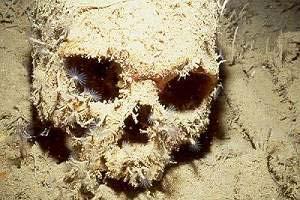Freighting the Whale VII: Sea Organum

Can't find that head ashore, nor is there even an apt literature either for dredging or querying such an head. Only on the outlaw sea, amid the infinite depths & swells, is there an organum, a deep enough note to sound what is deepest in our hearts. You want to sibyl the heart? Enquire after a head that's been to the bottom of the sea. After Ahab's reflection on the head of the sperm whale, he mutters, "O Nature and O soul of man! how far beyond all utterance are your linked analogies! not the smallest atom stirs or lives in matter, but has its cunning duplicate in mind."
Keats also went to sea to grab his great work -- had to. After completing Endymion, his first long poem, Keats wrote in a letter to J.A. Hessey on 8 Oct. 1818,
The genius of Poetry must work its own salvation in a man: It cannot be matured by law & precept, but by sensation & watchfulness in itself -- that which is creative must create itself -- In Endymion I leapt headlong into the sea, and thereby have become better acquainted with the soundings, the quicksands, & the rocks, than if I had stayed upon the green shore, and piped a silly pipe, and took tea & comfortable advice. -- I was never afraid of failure; I would sooner fail than not be among the greatest."
A daring enterprise, perhaps, and without much promise of success in the venture or recognition for the task. Moby Dick may have resolved all of the creative and intellectual problems that he had fought for years, but it did nothing to improve his circumstances. Moby Dick, like a great whale that couldn't remain tethered to the present for long, quickly sunk out of sight; it was widely ignored by reviewers (one did comment in the London Athenaeum that it was "so much trash belonging to the worst school of Bedlam literature") and most of the copies in print burned in a Harpers warehouse fire in 1853. Melville's writing career, for the most part, was finished.

<< Home